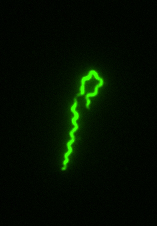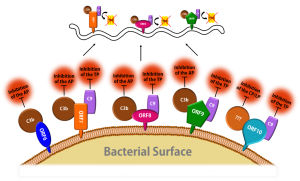C3: Complement-interacting proteins of relapsing fever Borrelia
Prof. Dr. Peter Kraiczy
Goethe-Universität Frankfurt/Main
Institut für Medizinische Mikrobiologie und Krankenhaushygiene
Universitätsklinikum Frankfurt
Paul-Ehrlich-Str. 40
60596 Frankfurt am Main
Tel.: +49 (0)69-6301 7165
Fax: +49 (0)69-6301 83431
E-Mail kraiczy(at)em.uni-frankfurt(dot)de
Project description:
Borrelia recurrentis is considered as a “neglected arthropod-borne pathogen” and the causative agent of louse-borne relapsing fever. If left untreated, the case-fatality rate of this epidemic disease can exceed >40%. The hematogenous dissemination suggests that borreliae developed efficient immune evasion strategies to overcome innate immunity, in particular complement. Proteins interacting with complement are known to play a crucial role in host-pathogen interaction. Bioinformatic analyses revealed a cluster of five proteins all of which inhibit complement at different activation levels. Of importance, molecules interacting with the immune system represent promising candidates for the development of in vitro diagnostics. Two test systems (Line immunoblot and ELISA) for the diagnosis of louse-borne relapsing fever have already been developed and evaluated.

Immunofluorescene microscopy of B. recurrentis.

Schematic representation of the complement inactivation on the outer surface of B. recurrentis.
Scientific goal:
The focus of this project deals with the functional and structural characterization of additional complement-inhibiting proteins of Borrelia recurrentis as well as the optimization of the evaluated test systems and the development of a point-of-care antigen test for the diagnosis of relapsing fever.
DRUID Collaboration partners:
B2 Ziebuhr lab, C2 Kempf lab, C4 Steinhoff lab, D1 Steinmetzer lab, E3 Rahlfs/Przyborski, Gold Standard Diagnostics (formerly NovaTec)
References C3: [1] Cordes et al. (2005) Nat Struct Mol Biol 12:276-277; [2] Röttgerding et al. (2017) Sci Rep 7:303; [3] Nguyen et al. (2018) Front Cell Infect Microbiol. 8:23; [4] Walter et al. (2019) Front Immunol 10:2722; [5] Röttgerding and Kraiczy (2020) Front Immunol 11:1560; [6] Schmidt et al. (2021) Sci Rep 11:4964.

